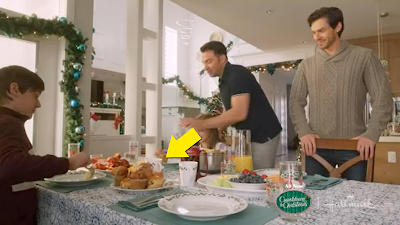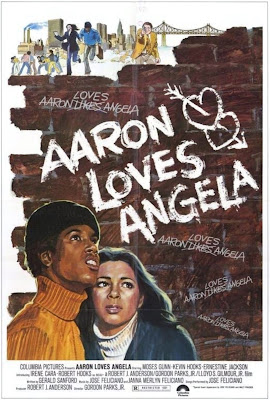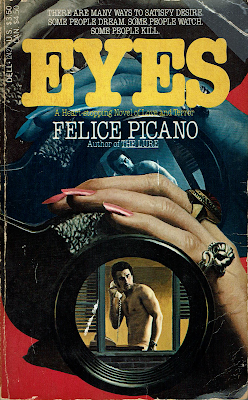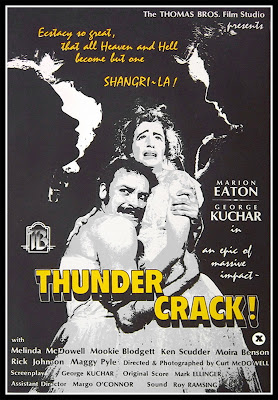 |
The poster photo of George Kuchar and
Marion Eaton makes it clear that this ain’t
Deep Throat.
|
2022 has no shortage of worthwhile Halloween viewing:
X,
Pearl,
Nope,
Barbarian, Fresh,
Hellraiser, the news.
Terrifier 2 is so extreme it reportedly has
audiences vomiting.But none of those movies leave audiences fearing where the cucumbers in their salads have been. So, this Halloween, let’s check out director Curt McDowell and screenwriter/star George Kuchar’s 1975 underground epic, THUNDERCRACK!
Six travelers are making their way across Nebraska on a proverbial dark and stormy night. There’s Bing (Kuchar), a high-strung circus employee driving a truckful of exotic animals, grumbling to himself about how much he hates the children in the audience—but not his beloved gorilla Medusa (“Gorillas are different than children. They have more hair.”)
Elsewhere, bisexual hitchhiker Toydy (Rick Johnson) gets a ride from Sash (Melinda McDowell, the director’s sister) and her sharp-tongued, perpetually horny girlfriend—and Brooklyn Community College Grad—Roo (Moira Benson). Roo asks—demands—to see what Toydy is working with. “Oh, honey, I’d give you the formula to the atomic bomb if I knew it,” she says when the hitchhiker takes out his cock. Toydy responds: “Didn’t they teach you that stuff at Brooklyn Community College?” But then an argument erupts between Sash and Roo, and their tussling sends the car careening off the road, resulting in a fiery explosion.
 |
| Chandler feels up Bond.* |
The fire is witnessed by two other travelers: another hitchhiker, Bond (Ken Scudder), and, at the wheel, Chandler (Mookie Blodgett, a.k.a. Phillip Heffernan), widower of the late Sarah Lou Phillips, the heiress to the House of Phillips Unlimited girdle empire. However, the two men have other things on their minds than the source of the fire. Chandler asks his passenger if his admiring glances at Bond’s “rather extravagant torso” have made him ill at ease. “Well, no,” Bond responds. “It’s just that all you’re doing is just
looking.”
The guys are interrupted when they’re flagged down by another traveler, Willene Cassidy (Maggie Pyle), virgin wife of country rock star Simon Cassidy. She also saw the explosion in the distance, and she urges Chandler and Bond to go investigate its source. Chandler wants to keep going to Waco, where he plans to burn down the House of Phillips factory. “You scare me, Mister,” Willene says. “You’re talking like some kind of beatnik.”
“Supposing I am,” Chandler replies. “What have you got against beatniks?”
“Well, for one thing, their bongo drums.”
Bond ultimately convinces Chandler to go investigate the scene of the fire, suggesting he’ll let the bi-curious Chandler have full use of his body if he does. Willene then goes to a nearby farmhouse to call for help.
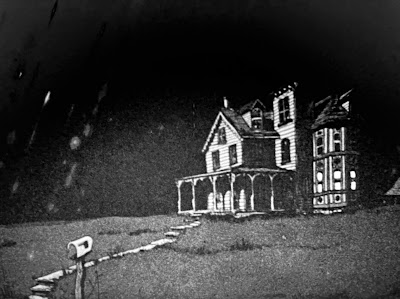 |
Prairie Blossom: An artist's representation.
|
The lady of the house, Gert (Marion Eaton), may not be much help. When Willene pounds on the door and calls out, the inebriated Gert gasps: “My God, that was a human voice. A
woman’s voice!” The shitfaced widow rushes to fix herself up before opening the door. Since she’s wearing only a slip and high heels, one would think she’d simply put a dress on, or maybe a robe, but instead Gert puts on a wig and draws on dark, asymmetrical eyebrows (a Kuchar trademark). Realizing she’s too drunk to receive visitors, Gert sticks her fingers down her throat, but, uh-oh, her wig falls in the toilet just as she’s blowing chunks. No worries. Gert just shakes the vomit off her wig, puts it back on her head and finally lets Willene into the house.
 |
Gert gets ready to receive visitors.
|
 |
Willene helps Gert cum clean.
|
Willene politely listens to Gert stumble through the history of Prairie Blossom, the house she and her late husband Charlie Hammond built, before guiding the poor thing into the bathroom to bathe her. “Would you mind washin’ me a little lower, please?” Gert simperingly asks. The seemingly naïve wife of country rock star Simon Cassidy obliges, getting a grateful thank you from Gert when she gets the widow off with a vigorous scrubbing.
Bond and Chandler arrive with Roo, Toydy and Sash, who conveniently escaped their wrecked car before it exploded. Everyone is irritable, but Gert, revivified from her recent bath and orgasm (as well as being more than a little nuts) welcomes everyone with a bright smile and opens her closet to her cranky guests, urging them to help themselves to some dry clothes. They must change clothes in the bedroom at the far end of the hall and, she urges them, be patient as each person takes their turn.
Things Get Weirder. And Filthier.
 |
Chandler prepares to fire up the penis pump...
|
From this point forward the movie gets delightfully dirty. The bedroom at the far end of the hall—once her son’s—is a veritable shrine to sex, with a large assortment of sex toys, tubes of KY and rubbers to choose from. Its walls are decorated with pages from skin mags; stills from hardcore porn movies, both gay and straight; and erotic art (including a cartoon by the director). One poster that stands out is a generic portrait of George Washington, yet because it’s so innocuous, no one bothers to inspect it too closely. If they did, they would discover Washington’s eyes are cut out, allowing Gert a clear view through two peepholes drilled into the kitchen wall.
 |
... as Gert watches.
|
And Gert gets a lengthy show as her weary and horny travelers give in to erotic temptation. Chandler avails himself of a very loud penis pump (seriously, it sounds like a rotary rock tumbler), while Roo uses a vibrator with a dildo attachment. Toydy fucks an inflatable sex doll while jamming a dildo up his ass, with some difficulty (“Get up there, goddammit!”). Only Sash—who, remember, is played by the director’s sister—takes a partner while in Prairie Blossom’s X-rated bedroom, boning Bond, who wears a novelty rubber for the occasion. (In the documentary It Came from Kuchar, Melinda McDowell-Milk mentions that Curt always wanted to celebrate sex in his work yet frustratingly never mentions how she felt performing in Thundercrack!’s hardcore scenes while being filmed by her brother. She was instrumental in getting the film restored for a Blu-ray release, so she clearly wasn’t traumatized by the experience, but I still wanted to hear her account of filming.)
 |
Willene enjoys a refreshing snack.
|
While she watches from the kitchen, Gert masturbates with a rather long peeled cucumber. She’s barely finished with the cuke when Willene enters the kitchen, looking for a snack. She plucks the well-lubricated cuke from the bowl of fruit where Gert tossed it (“This looks refreshing”) and takes a bite, because you just knew someone was going to eat it. According to this movie’s
IMDb’s trivia page, actress Maggie Pyle was, unbeknownst to her, eating the actual cucumber that had been up Eaton’s cooch, as payback for being a pain in the ass (i.e., showing up for filming drunk or otherwise fucked up). Kind of makes you wonder how many suspicious salads
these people have been served while on set.
There are quite few more sex scenes to get through (the movie is almost three hours long), including Toydy fucking Bond. There are also a lot more secrets, like who’s pickled head is that down in the basement? What’s behind that locked door in the living room? And what does Gert mean when she insists that her son is not dead, he simply “no longer exists”?
 |
Dinner is served!
|
But before any of those questions can be answered, the house is surrounded by circus animals. A frantic Bing is let inside, and he has some secrets of his own, mostly involving his complicated relationship with the gorilla, Medusa. “Don’t minimize the danger, Mac,” he tells Toydy. “Medusa didn’t get that name for nothin’. One look at those blazing, red eyes surrounded by that black, matted hair can freeze a man to a block of stone on the spot. She made
me hard one night.”
Cue a flashback sequence featuring underground filmmaker George Kuchar getting a hand-job from a gorilla (or, rather, Curt MacDowell in a gorilla suit). At this point, though, we’d be surprised if someone didn’t have sex with a gorilla.
Hardcore, But Not Necessarily Porn
Thundercrack! was originally conceived as a porn cash-in by McDowell and composer Mark Ellinger (both credited with Thundercrack!’s story), but the script written by Kuchar, who had been making underground movies with his twin brother Mike since the late 1950s, took the project in a different and wonderful direction. “I knew it wouldn’t make any money, because anything I work on is a financial disaster,” says Kuchar in the It Came from Kuchar documentary.
And Thundercrack! wasn’t a cash cow, either, but that doesn’t make it any less of a masterpiece. Sure, it’s not the most polished movie, with iffy sound and scene compositions that are at times more stagey than cinematic. And, sure, it doesn’t need to be nearly 3 hours long, but it’s not a problem that it is. You won’t be bored, no matter how many times you watch it. I’ve watched it several times and I always discover something I missed from previous viewings. Kuchar’s script has so many great lines that to include them all in this post would mean transcribing the movie’s entire script.
 |
Chandler enjoys the show.
|
Eaton’s tour de force performance as Gert is another reason to seek this one out. Eaton was already an
accomplished stage actress when, in her 40s, she decided to enter the world of adult films. The first adult movie she made,
Sip the Wine, was produced by Heffernan, who told her about the auditions for
Thundercrack! McDowell reportedly interrupted her during her audition to tell her the part was hers. And it’s hard to imagine anyone else in the role (though Georgina Spelvin would’ve been a good second choice). Eaton’s performance is at once sincere and a drag parody. Gert is an outrageous character, but Eaton doesn’t let us forget her humanity.
Kuchar gives the movie’s other standout performance, though after watching the documentary about him I’m not entirely sure he was acting. Scudder, who appeared in numerous porn films from the mid-1970s to the mid ’80s, one-and-done Johnson, and Heffernan, are all better than average, and Pyle is effective as Willene (not sure if her being drunk/stoned helped, but it didn’t hurt). The weakest performances are from Benson and (sorry!) Melinda McDowell, who, bless her heart, struggles the hardest to get out the mouthfuls of dialog required of her.
Thundercrack! is hard to categorize. It’s a send-up of old, dark house and hag horror tropes, but it’s not exactly a horror comedy (though it is very funny), and it’s certainly not a porn parody. In fact, though it has a lot of hardcore sex scenes, I don’t really consider it a porno at all. In the context of Kuchar’s script, the intention of the sex scenes is to shock rather than titillate. Thundercrack! is its own glorious thing. You may not be turned on, and you definitely won’t be scared, but you won’t fucking forget it.
*Don’t judge the movie’s cinematography by the quality of the stills in this post, which were photographed from my computer screen while the Blu-ray was paused.




